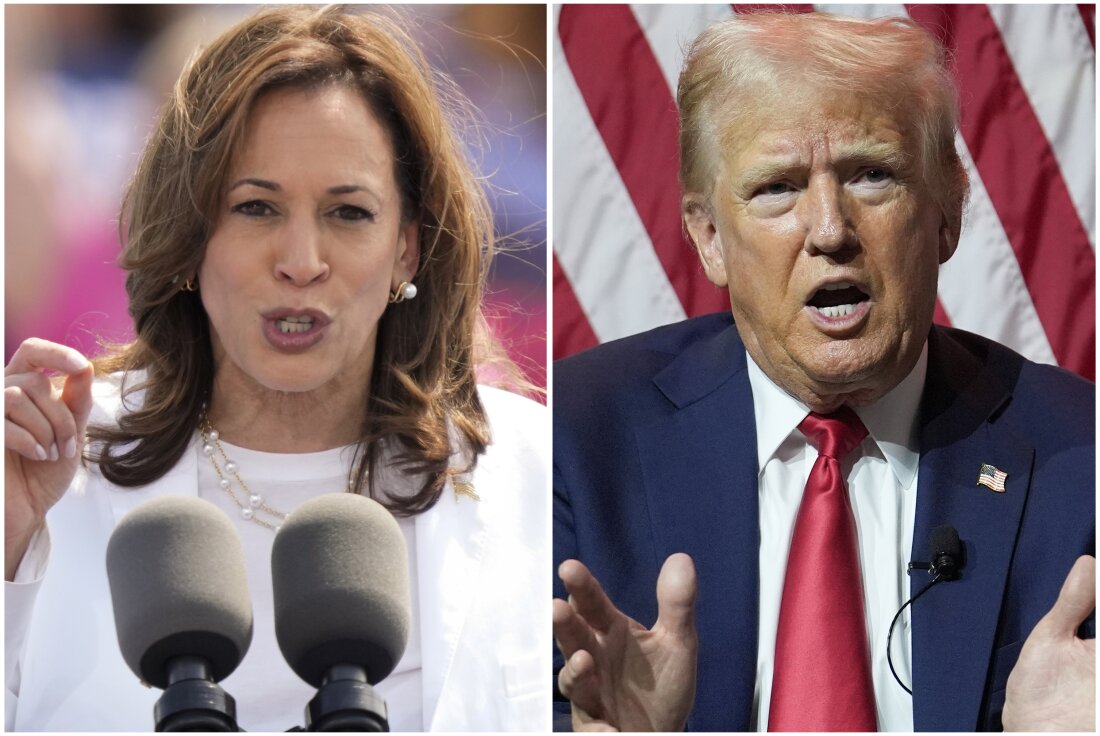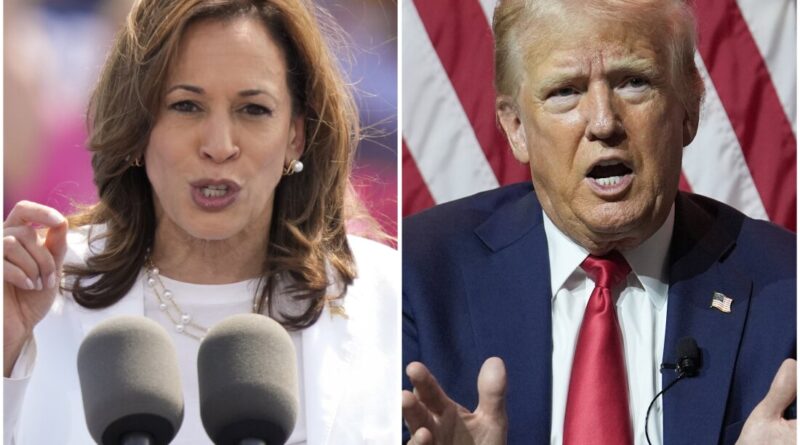Here’s where Harris and Trump stand on three big health issues

Vice President-elect Kamala Harris and former President Donald Trump differ on how they would tackle several health issues, including drug prices.
Charles Rex Arbogast / AP
hide description
toggle caption
Charles Rex Arbogast / AP
As the 2024 election heads into its final weeks, the direction of policies that affect the lives of millions of Americans is at stake.
The next president and Congress will have the power to put their stamp on major health care programs like Medicare and Medicaid that together cover about 150 million Americans. They will be able to provide resources for how the United States is fighting the drug addiction crisis and how the country is preparing for the next epidemic.
A recent poll found that two-thirds of Americans say health care should be given more attention in the presidential campaign, and there are several important health policy options. which the incoming president will face in his first year. Here are the candidates’ views on the three issues:
1. What is the future of Medicare drug price negotiations?
The Biden-Harris administration achieved historic success by giving Medicare the power to directly negotiate the prices of some of the most expensive drugs. State health workers the first 10 negotiated prices take effect in 2026, patients and Medicare will save a total of $7.5 billion.
Some top Republicans want to repeal that authority, arguing that cutting drug makers’ profits would reduce their incentive to develop the next blockbuster treatment. Several pharmaceutical companies have also sued the federal government, claiming that Medicare’s bargaining power is unconstitutional.
Trump has not said whether he supports repealing the law or whether he will continue to defend it in court. Stacie Dusetzina, a professor of health policy at Vanderbilt University Medical Center, says the new Medicare mandate is still in jeopardy.
“Once you give Medicare providers enhanced benefits, it’s hard to get rid of them,” Dusetzina acknowledged. But I think that because the negotiated prices won’t come into effect until 2026, nobody will miss them. [if they are repealed].”
Harris said he wants Medicare to “accelerate the pace of negotiations so that the prices of many drugs can come down quickly.” Experts believe that could mean negotiating the price of more drugs, or starting to negotiate earlier in the drug’s life cycle. Both moves would require congressional signature.
Harris’ campaign says he will invest any additional money in new policy proposals, such as expanding Medicare coverage for home health care. But a recent report from the Congressional Budget Office estimates that the additional revenue from such efforts could be small.
Dusetzina also said it’s unclear whether Harris’ plan will slow the pipeline of new drugs.
“I think it’s important to be a little careful about how big and broad you are going to be at once,” he said. What does that mean for drug development? What does that mean for patient access?”
Trump has not yet explained how his administration will conduct the talks. Health care experts note that the Trump administration may have little ability to undermine the law if it remains in place, because the rules guide Medicare in which drugs it selects for referrals, and set the minimum discounts the government should seek.
2. Should Congress extend the Affordable Care Act’s reformed subsidies?
For people who buy health insurance in the ACA marketplace, the federal government subsidizes a portion of the monthly health insurance premiums that most pay. Under the original law, lawmakers gave aid to people who made 400% of the federal poverty level — today that’s about $125,000 for a family of four.
Democrats in Congress eliminated the income tax through 2021 and increased the size of grants. Consumers’ share of their premiums has almost been cut in half, according to health research organization KFF. Since the subsidy increase, the number of people signing up for ACA coverage has nearly doubled to more than 21 million people.
These revised subsidies, as they are called, are slated to expire at the end of 2025. If that happens, KFF estimates that monthly premiums for people with ACA-subsidized plans will has doubled in many states, and the Congressional Budget Office estimates that enrollment in the ACA. the gap would be reduced by 7 or 8 million people. (CBO estimates that about half of those people would receive job protection.)
Vice President Harris has said he wants to make these subsidies permanent, costing Washington an estimated $335 billion over the next decade. Former President Trump has not named the position, but many Republicans, including former Trump officials, argue that the benefit should end.
Many Republicans point to a report released this year by the Paragon Health Center that found as many as 5 million people falsified their incomes, possibly trying to cheat the government and qualify for health plans. $0-premium beauty. According to Paragon, this process costs taxpayers up to $26 billion.
Some health policy experts say there is an unfortunate explanation. Cynthia Cox, KFF vice president, said it can be very difficult, especially for people in many low-wage jobs, to predict their annual earnings. What may seem bleak on paper may be a best guess gone wrong.
“It can depend on how many tips you get, or how many rides you take, or how many shifts you work,” Cox said. This is where I think there is another important thing to consider, like is it really a scam or not?
There are provisions in the law, Cox added, to force people to pay back all or part of their benefits if their estimate was wrong.
Michael Cannon, director of health policy at the libertarian Cato Institute, blames subsidies for fueling another type of fraud — that of insurance brokers. Federal health officials have received 275,000 complaints this year about vendors signing people up for Obamacare coverage without their consent. Dealers receive a commission for each person they sign up for service, and customers who don’t have to pay a monthly premium may be less likely to notice a change in their insurance.
“If more subscribers had to pay at least a little something to sign up for these plans, that would check a lot of unscrupulous marketers,” Cannon said.
Government officials have suspended 850 dealers, proposed new laws to crack down on bad dealer behavior and have resolved almost all complaints.
3. Will medical abortion ever exist?
About two-thirds of abortions in the US are now medical abortions, usually involving two types of pills – mifepristone and misoprostol. In June, the United States Supreme Court dismissed an attempt by anti-abortion advocates to revoke the Food and Drug Administration’s longstanding approval of and expand access to mifepristone. But, depending on the vote, new leaders at the FDA may move to restrict (or further expand) access to medical abortion.
Under the Biden-Harris administration, the FDA allowed doctors to prescribe mifepristone to any patient via telehealth instead of requiring patients to see their provider in person. Telehealth mandates now enable 1 in 5 abortions in the US, and Harris has made protecting and expanding abortion access a central part of his campaign.
Trump rose. At times the former president has said that he will not block access, and at others that he will be open to government restrictions. Plan 2025, the executive order written by former Trump officials and other close advisers, calls on the FDA to withdraw its approval of mifepristone.
“I think a lot of people don’t know that we can trust what he says because it’s always different,” said Ederlina Co, an associate professor of law at the University of the Pacific.
If the Trump administration were to ban or cut off access to mifepristone, people could still have medical abortions using just another pill, misoprostol. Misoprostol used alone is safe and effective but can have many side effects.
Uncertainty about Trump’s health plan
Harris’ position on all three issues is clear. He supports expanding the ACA’s revised subsidies. He supports drug deregulation and would like to strike Medicare drug deals.
It is even more difficult to predict what will happen to health policy under the second Trump administration because he has not taken public positions on many major issues.
“When former President Trump outlines his plans, the language is often so comprehensive that it’s hard to read,” said KFF’s Cox.
For example, until recently one of Trump’s clearest positions on prescription drug prices was the “most favored nation” policy he introduced late in his first term. It would have forced drugmakers to sell certain drugs to Medicare at rates paid by other states.
A few weeks ago, the Trump campaign said Politics and Stat that the former president will not renew the policy in the second term.
Aside from that policy that has already been dropped, Ben Ippolito, a health economist at the American Business Institute, said it’s “a little difficult to predict” how Trump will handle health care.
This story comes from the health policy news organization Tradeoffs. Ryan Levi is the reporter/producer for the show, where the version of this story he first appeared. You can listen here:
#Heres #Harris #Trump #stand #big #health #issues
